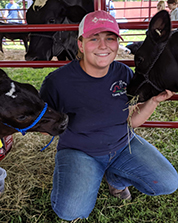
As I made the last lap around the hayfield yesterday, I stopped to look out at the vast, neatly harvested field in front of me and smiled. We had completed another harvest season. It was a long, dry one that didn’t produce nearly enough, but it was done, and a heavy weight felt like it had been lifted ever so slightly.
The drought definitely took its toll this year by reducing our yields by nearly 60% on the silage side and 40% on the hay side. As staggering as those numbers may seem, we are ever grateful for what we did receive. The drought could have been worse, and we could be trying to get commodities to cover our loses, but we don’t have to do that at the moment. We were fortunate not to have to deal with natural disasters during crop season, and we helped provide support to our counterparts in North Carolina, Tennessee and southwest Virginia. It’s been a crazy weather year.
The phrase, “All good things must come to an end,” has never applied to my farm as crops only tend to take a respite when they’re not in season and even when I lose an animal, its legacy continues in their offspring. As the fields prepare for a break, we breathe a sigh of relief for all of about two seconds. Crops may have been a huge ordeal, but, as they said in “Game of Thrones,” winter is coming.
While we take stock of the hay bales and silage, we also make a list of all the little things we’ve put off throughout crop season — things like greasing the loaders, fixing a squeaky hinge, maintaining the stalls in the free stall barn, and the list goes on and on. The famous “That can wait for winter” list suddenly becomes top priority.
As I made that last round, I couldn’t help but laugh as I realized that as the seasons change, so do the priorities and work. The quick sigh of relief became a quick breath of air before having to prepare for next year. Nothing truly ends, and seasons just lead to new adventures. Stay safe, y’all.

The author is a sixth-generation farmer and fifth-generation dairy producer in southwest Virginia, where she and her family own and operate a 145-head Holstein dairy. Courtney is involved in agriculture organizations throughout her community and is a graduate of Virginia Tech.








